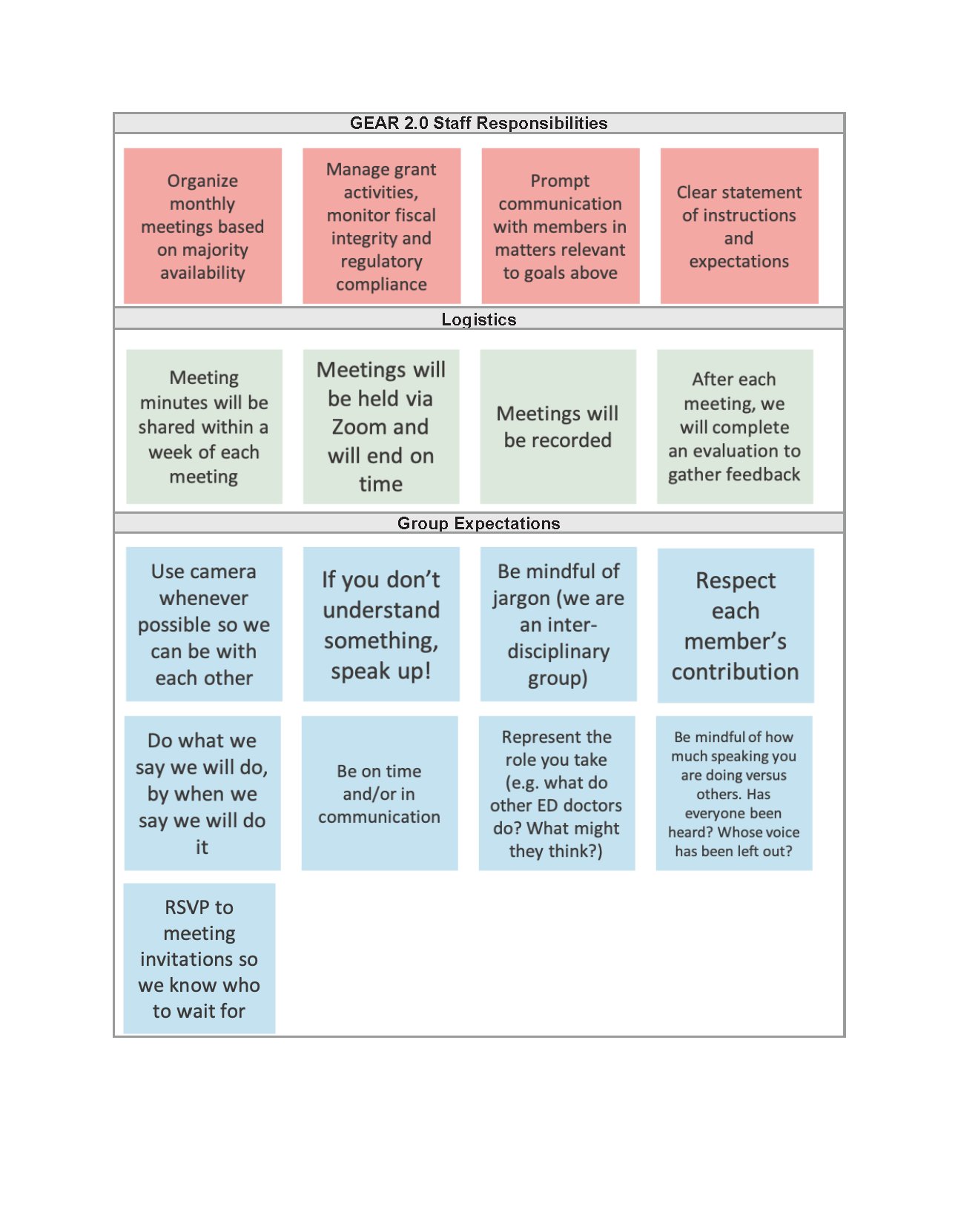Recruitment, Engagement, and Retention Core Charter
This charter document delineates the GEAR 2.0 ADC Research Core Group project purpose, goals, and participant expectations.
Contact information:
Andrea Gilmore-Bykovskyi, PhD RN algilmore@wisc.edu
Manish N. Shah, MD MPH mnshah@medicine.wisc.edu
I) Purpose and Goals
GEAR 2.0 ADC Description
GEAR 2.0 ADC Goals
To establish collaborations, resources, and research infrastructure to foster transdisciplinary researchers in the emergency care of older adults with ADRD and their caregivers.
Phase 1 Aims (R61): Identify and propose strategies to address research gaps. Establish the GEAR 2.0 ADC infrastructure. (Yr 1-2)
- Determine research priorities for ED care of PLWD and their caregivers using a consensus process in four domains: 1. ED practices, 2. ED care transitions, 3. Detection, and 4. Communication and decision making.
- Determine the strength of available evidence by systematically conducting scoping reviews.
- Prioritize research and practice gaps in emergency care for PLWD by convening a transdisciplinary stakeholder taskforce meeting.
- Establish GEAR 2.0 – ADC governance and operations to support R33 pilot studies by partnering and leveraging transdisciplinary networks and organizations: including GEDC, ADRCs, and GEAR 2.0 Cores: 1. Administrative, 2. Research, 3. Data/Informatics, and 4. Dissemination & Implementation.
Phase 2 Aims (R33): Support research strategies. (Yr 3-5)
- Solicit, review, select, and fund research that will lead to future full-scale proposals addressing research gaps in emergency care for PLWD and their care partners.
- Deploy resources to support collaborative emergency care dementia research.
Project Successfully Complete When:
II) Recruitment, Engagement, and Retention Core Purpose and Goals
Recruitment, Engagement, and Retention Core Description
This Recruitment, Engagement, and Retention Core will support pilot grantees to navigate challenges in participant recruitment, engagement, and retention, particularly PLWD and care partners, in emergency care research. It will provide training and guidance on (1) effective strategies for strengthening research accessibility and engagement, (2) approaches to improve participation among populations that are marginalized and/or historically under-represented in research, and (3) mechanisms for leveraging end-user/stakeholder feedback to refine recruitment practices.
Recruitment, Engagement, and Retention Core Specific Aims
This core will oversee the many unique aspect of participant recruitment, engagement, and
retention in the ED and with PLWD and care partners. The Recruitment, Engagement, and
Retention Core will support GEAR 2.0-ADC pilot studies in 4 specific ways:
- Establish a foundational understanding of principles of scientific inclusion and research equity among grantees.
- Conduct training to help grantees cultivate a practice of reflection to proactively manage and refine recruitment, engagement, and retention practices including end-user feedback to guide actionable plans for improvement.
- Conduct training on effective strategies for engaging with communities and stakeholders, particularly PLWD, their care partners, and members of marginalized or historically under-represented populations.
- Work collectively with our research partners to provide referred consultations as needed.
Core Staff
Andrea Gilmore-Bykovskyi, PhD RN
Recruitment and Retention Core Lead
University of Wisconsin-Madison
algilmore@wisc.edu
Manish N. Shah, MD MPH
GEAR 2.0-ADC PI Representative
University of Wisconsin-Madison
mnshah@medicine.wisc.edu
Responsibilities & Expectations

